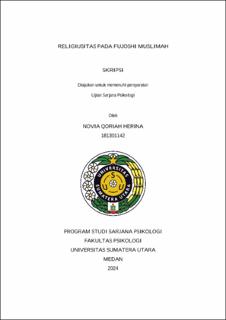| dc.description.abstract | Fujoshi is a term used to refer to a group of women who like fantasy stories with a homosexual romance genre. Homosexual fantasy stories in the wider community today are known as BL (Boy's Love). Fujoshi tend to hide their identity as fujoshi. This is due to the norms that apply in society and religion. In Islam, the hobby of consuming homosexual things is included in adultery of the eyes and mind. Meanwhile, based on a survey conducted on fujoshi, 21 out of 30 fujoshi are Muslim. Fujoshi who were originally hidden in carrying out their activities, since the era of globalization have begun to show their interest in BL openly. Religiosity can help someone avoid negative behavior and attitudes that violate the norms and rules of everyday life. Religiosity is influenced by various internal and external factors. This study was conducted to see the picture of religiosity in Muslim fujoshi using a qualitative method with a phenomenological approach. The subjects in this study were two people. The research method used was to conduct in-depth interviews with general guidelines and observations during the development of rapport and the interview process. The subjects in this study consisted of two people. The results of the study showed that in general both subjects met the understanding value of each sub-aspect of religiosity introduced by Krauss et al. (2005), namely the Islamic Worldview aspect with the sub-aspects of creator and creation, existence and transcendence, and all encompassing religion and the Religious Personality aspect with the sub-aspects of self-directed, interpersonal-interactive and formal worship. For the attitude and emotional values, these sub-aspects were generally not met. The part that was met in subject I was only the interpersonal-interactive sub-aspect while in subject II it was only the existence and transcendence sub-aspect. | en_US |


